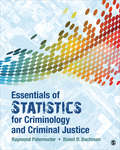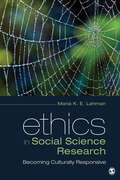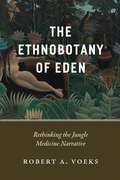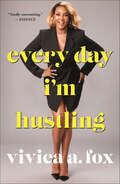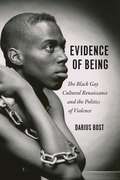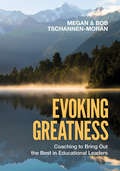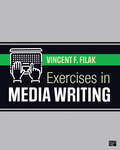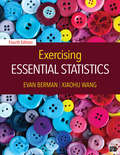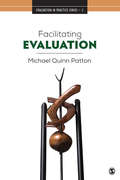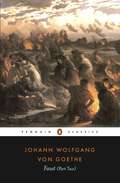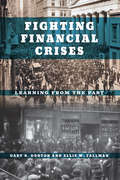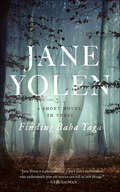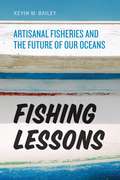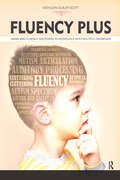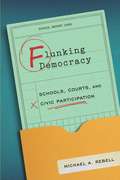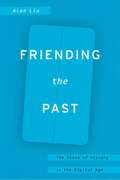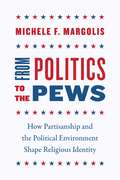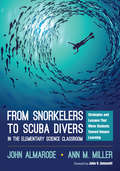- Table View
- List View
Essentials of Statistics for Criminology and Criminal Justice: Paternoster: Essentials Of Statistics For Criminology And Criminal Justice + Spss 23. 0
by Raymond Paternoster Ronet D. BachmanEssentials of Statistics for Criminology and Criminal Justice helps students understand the vital role that research and statistics play in the study of criminology and criminal justice by showing them how to conduct and interpret statistics in real-world settings with a step-by-step approach to solving problems. This practical, applied approach offers students the fundamentals of descriptive and inferential statistics in a concise and easy-to-understand format—avoiding complicated proofs and discussions of statistical theory. The examples and case studies provide relevant examples for criminology and criminal justice students, and deal with contemporary issues related to crime, corrections, police, and the judicial system. Students will not only learn about the "how to" in statistics, but they will also recognize its importance in today’s criminal justice system.
Ethics in Social Science Research: Becoming Culturally Responsive
by Maria K. LahmanEthics in Social Science Research: Becoming Culturally Responsive provides a thorough grounding in research ethics, along with examples of real-world ethical dilemmas in working with vulnerable populations. Author Maria K. E. Lahman aims to help qualitative research students design ethically and culturally responsive research with communities that may be very different from their own. Throughout, compelling first person accounts of ethics in human research—both historical and contemporary—are highlighted and each chapter includes vignettes written by the author and her collaborators about real qualitative research projects.
Ethics in Social Science Research: Becoming Culturally Responsive
by Maria K. LahmanEthics in Social Science Research: Becoming Culturally Responsive provides a thorough grounding in research ethics, along with examples of real-world ethical dilemmas in working with vulnerable populations. Author Maria K. E. Lahman aims to help qualitative research students design ethically and culturally responsive research with communities that may be very different from their own. Throughout, compelling first person accounts of ethics in human research—both historical and contemporary—are highlighted and each chapter includes vignettes written by the author and her collaborators about real qualitative research projects.
The Ethnobotany of Eden: Rethinking the Jungle Medicine Narrative
by Robert A. VoeksIn the mysterious and pristine forests of the tropics, a wealth of ethnobotanical panaceas and shamanic knowledge promises cures for everything from cancer and AIDS to the common cold. To access such miracles, we need only to discover and protect these medicinal treasures before they succumb to the corrosive forces of the modern world. A compelling biocultural story, certainly, and a popular perspective on the lands and peoples of equatorial latitudes—but true? Only in part. In The Ethnobotany of Eden, geographer Robert A. Voeks unravels the long lianas of history and occasional strands of truth that gave rise to this irresistible jungle medicine narrative. By exploring the interconnected worlds of anthropology, botany, and geography, Voeks shows that well-intentioned scientists and environmentalists originally crafted the jungle narrative with the primary goal of saving the world’s tropical rainforests from destruction. It was a strategy deployed to address a pressing environmental problem, one that appeared at a propitious point in history just as the Western world was taking a more globalized view of environmental issues. And yet, although supported by science and its practitioners, the story was also underpinned by a persuasive mix of myth, sentimentality, and nostalgia for a long-lost tropical Eden. Resurrecting the fascinating history of plant prospecting in the tropics, from the colonial era to the present day, The Ethnobotany of Eden rewrites with modern science the degradation narrative we’ve built up around tropical forests, revealing the entangled origins of our fables of forest cures.
Every Day I'm Hustling
by Vivica A. FoxVivica A. Fox is a dynamo who has created a lasting career on her own, through sheer, roll-up-your-sleeves DIY hustle. Every Day I'm Hustling is a personal book with a message Fox passionately believes in: that you make your own luck, that you never ever wake up in the morning thinking somebody’s going to call you and offer you that part or ask you out on that date that’s going to change your life, that you have to wake up and put on your longest eyelashes and fiercest heels and go out and make your life happen yourself. The actress provides start-today strategies for success in business and “been there” lessons in love, buttressed with stories from her early family life all the way through to today. Always honest and always funny, Fox also tells behind-the-scenes tales from some of her biggest movies — such as Uma Thurman’s life-changing advice during Kill Bill and Will Smith's downtime pep talk on Independence Day. And she maps out exactly what it took to come back with a role on the smash hit Empire and her own frisky show on Lifetime, Vivica’s Black Magic. She also shares her how-is-she-53? secrets to looking your best, no matter the age on your driver’s license.
Evidence of Being: The Black Gay Cultural Renaissance and the Politics of Violence
by Darius BostEvidence of Being opens on a grim scene: Washington DC’s gay black community in the 1980s, ravaged by AIDS, the crack epidemic, and a series of unsolved murders, seemingly abandoned by the government and mainstream culture. Yet in this darkest of moments, a new vision of community and hope managed to emerge. Darius Bost’s account of the media, poetry, and performance of this time and place reveals a stunning confluence of activism and the arts. In Washington and New York during the 1980s and ’90s, gay black men banded together, using creative expression as a tool to challenge the widespread views that marked them as unworthy of grief. They created art that enriched and reimagined their lives in the face of pain and neglect, while at the same time forging a path toward bold new modes of existence. At once a corrective to the predominantly white male accounts of the AIDS crisis and an openhearted depiction of the possibilities of black gay life, Evidence of Being above all insists on the primacy of community over loneliness, and hope over despair.
Evoking Greatness: Coaching to Bring Out the Best in Educational Leaders
by Megan Tschannen-Moran Robert K. Tschannen-MoranDiscover coaching strategies to inspire greatness in any educational leader! Centered on evocative coaching, a person-centered, no-fault, strengths-based coaching model, this book will equip those who coach educational leaders to host engaging and productive coaching conversations. Coaches who read this book will learn to LEAD: Listen, Empathize, Appreciate, and Design, as well as to discover: Guidance for coaching leaders with specific questions, things to listen for, and ways to generate new ideas and motivation Research-based theories that ground the strategies presented in each chapter Real-life vignettes that illustrate the evocative coaching model in action Reflection and discussion questions, templates, and other materials to scaffold the learning of coaches as they innovate their way forward "Leadership coaching has arisen as a powerful intervention to support the professional learning of leaders. In this book Megan and Bob Tschannen-Moran invite us to see into their world of evocative coaching. They demonstrate how coaching conversations can lead to a flow of energy, enthusiasm and possibilities that bring out movement in people. The authors combine their theoretical knowledge with their experience as coaches, exemplified in wonderful stories and practical examples. As a coach myself I could not stop reading because I was so curious about the next chapter. The book is a great example of how high quality professional learning can enhance educational leaders′ daily leadership practice." —Marit Aas, Associate Professor University of Oslo, Oslo, Norway
Evoking Greatness: Coaching to Bring Out the Best in Educational Leaders
by Megan Tschannen-Moran Robert K. Tschannen-MoranDiscover coaching strategies to inspire greatness in any educational leader! Centered on evocative coaching, a person-centered, no-fault, strengths-based coaching model, this book will equip those who coach educational leaders to host engaging and productive coaching conversations. Coaches who read this book will learn to LEAD: Listen, Empathize, Appreciate, and Design, as well as to discover: Guidance for coaching leaders with specific questions, things to listen for, and ways to generate new ideas and motivation Research-based theories that ground the strategies presented in each chapter Real-life vignettes that illustrate the evocative coaching model in action Reflection and discussion questions, templates, and other materials to scaffold the learning of coaches as they innovate their way forward "Leadership coaching has arisen as a powerful intervention to support the professional learning of leaders. In this book Megan and Bob Tschannen-Moran invite us to see into their world of evocative coaching. They demonstrate how coaching conversations can lead to a flow of energy, enthusiasm and possibilities that bring out movement in people. The authors combine their theoretical knowledge with their experience as coaches, exemplified in wonderful stories and practical examples. As a coach myself I could not stop reading because I was so curious about the next chapter. The book is a great example of how high quality professional learning can enhance educational leaders′ daily leadership practice." —Marit Aas, Associate Professor University of Oslo, Oslo, Norway
Exercises in Media Writing
by Vincent F. FilakExercises in Media Writing offers students multiple opportunities to practice their writing skills in-class or as take-home assignments. Each chapter includes review questions and writing-prompt activities to help students master the concepts and skills presented in Vincent F. Filak’s second edition of Dynamics of Media Writing. Additional exercises built around the unique demands of online newswriting will prepare students to meet the demands of a changing media landscape. Key Features: Review Questions help students recall and master core chapter concepts Writing Exercises enable students to recall and demonstrate their understanding of various elements found in each chapter in Dynamics of Media Writing, Second Edition. Bundle this workbook with Dynamics of Media Writing and save! Your students save when you bundle this text with a corresponding student workbook. Order using bundle ISBN 9781544361970.
Exercises in Media Writing
by Vincent F. FilakExercises in Media Writing offers students multiple opportunities to practice their writing skills in-class or as take-home assignments. Each chapter includes review questions and writing-prompt activities to help students master the concepts and skills presented in Vincent F. Filak’s second edition of Dynamics of Media Writing. Additional exercises built around the unique demands of online newswriting will prepare students to meet the demands of a changing media landscape. Key Features: Review Questions help students recall and master core chapter concepts Writing Exercises enable students to recall and demonstrate their understanding of various elements found in each chapter in Dynamics of Media Writing, Second Edition. Bundle this workbook with Dynamics of Media Writing and save! Your students save when you bundle this text with a corresponding student workbook. Order using bundle ISBN 9781544361970.
Exercising Essential Statistics
by Evan M. Berman XiaoHu WangThrough the use of critical thinking questions and data-based exercises Exercising Essential Statistics helps students apply the techniques described in Essential Statistics for Public Managers and Policy Analysts, Fourth Edition. This accompanying workbook gives students the opportunity to practice these techniques through hands-on, carefully crafted exercises. Various examples are provided from human resource management, organizational behavior, budgeting, and public policy to illustrate how public administrators interact with and analyze data.
Exercising Essential Statistics
by Evan M. Berman XiaoHu WangThrough the use of critical thinking questions and data-based exercises Exercising Essential Statistics helps students apply the techniques described in Essential Statistics for Public Managers and Policy Analysts, Fourth Edition. This accompanying workbook gives students the opportunity to practice these techniques through hands-on, carefully crafted exercises. Various examples are provided from human resource management, organizational behavior, budgeting, and public policy to illustrate how public administrators interact with and analyze data.
Facilitating Evaluation: Principles in Practice (Evaluation in Practice Series #2)
by Michael Quinn PattonMichael Quinn Patton’s Facilitating Evaluation: Principles in Practice is the first book of its kind to explain in depth and detail how to facilitate evaluation processes with stakeholders. Using the author’s own stories of his experiences as an evaluation facilitator, the book illustrates the five evaluation facilitation principles that are the organizing framework for addressing how to work with stakeholders to generate evaluation questions, make decisions among methods, interpret findings, and participate in all aspects of evaluation. Ultimately, this book will help readers perform facilitation to enhance the relevance, credibility, meaningfulness, and utility of evaluations. "A must-read for anyone considering a high-impact evaluation!" –Margaret Lombe, Boston College
Facilitating Evaluation: Principles in Practice (Evaluation in Practice Series #2)
by Michael Quinn PattonMichael Quinn Patton’s Facilitating Evaluation: Principles in Practice is the first book of its kind to explain in depth and detail how to facilitate evaluation processes with stakeholders. Using the author’s own stories of his experiences as an evaluation facilitator, the book illustrates the five evaluation facilitation principles that are the organizing framework for addressing how to work with stakeholders to generate evaluation questions, make decisions among methods, interpret findings, and participate in all aspects of evaluation. Ultimately, this book will help readers perform facilitation to enhance the relevance, credibility, meaningfulness, and utility of evaluations. "A must-read for anyone considering a high-impact evaluation!" –Margaret Lombe, Boston College
Fashion History: A Global View (Dress, Body, Culture Ser.)
by Linda Welters Abby LillethunFashion History: A Global View proposes a new perspective on fashion history. Arguing that fashion has occurred in cultures beyond the West throughout history, this groundbreaking book explores the geographic places and historical spaces that have been largely neglected by contemporary fashion studies, bringing them together for the first time. Reversing the dominant narrative that privileges Western Europe in the history of dress, Welters and Lillethun adopt a cross-cultural approach to explore a vast array of cultures around the globe. They explore key issues affecting fashion systems, ranging from innovation, production and consumption to identity formation and the effects of colonization. Case studies include the cross-cultural trade of silk textiles in Central Asia, the indigenous dress of the Americas and of Hawai'i, the cosmetics of the Tang Dynasty in China, and stylistic innovation in sub-Saharan Africa. Examining the new lessons that can be deciphered from archaeological findings and theoretical advancements, the book shows that fashion history should be understood as a global phenomenon, originating well before and beyond the fourteenth century European court, which is continually, and erroneously, cited as fashion's birthplace. Providing a fresh framework for fashion history scholarship, Fashion History: A Global View will inspire inclusive dress narratives for students and scholars of fashion, anthropology, and cultural studies.
Faust: (Part Two) (Thrift Editions Ser.)
by Johann Wolfgang GoetheThe second part of Goethe's masterpiece opens with Faust struggling to recover from the death of his beloved Gretchen. The quick-witted demon Mephistopheles soon persuades him to look beyond his sorrow and enter the world of politics and power, but the great scholar is still eager for new sensations, and asks Mephistopheles to reveal Helen of Troy to him in a vision. Overwhelmed by her beauty, Faust demands she be brought back from the underworld - but even this fails to bring him contentment, and his appetite for knowledge remains unsated. Completed a few months before Goethe's death, this rich and allusive work weaves together a wealth of diverse philosophical ideas and influences, reworking the medieval myth of Dr Faustus and speculating upon the search for truth in the Age of Enlightenment.
Fighting Financial Crises: Learning from the Past
by Gary B. Gorton Ellis W. TallmanIf you’ve got money in the bank, chances are you’ve never seriously worried about not being able to withdraw it. But there was a time in the United States, an era that ended just over a hundred years ago, when bank customers had to pay close attention to the solvency of the banking system, knowing they might have to rush to retrieve their savings before the bank collapsed. During the National Banking Era (1863–1913), before the establishment of the Federal Reserve, widespread banking panics were indeed rather common. Yet these pre-Fed banking panics, as Gary B. Gorton and Ellis W. Tallman show, bear striking similarities to our recent financial crisis. Fighting Financial Crises thus turns to the past to better understand our uncertain present, investigating how panics during the National Banking Era played out and how they were eventually quelled and prevented. The authors then consider the Fed’s and the SEC’s reactions to the recent crisis, building an informative new perspective on how the modern economy works.
Finding Baba Yaga: A Short Novel in Verse
by Jane YolenFinding Baba Yaga is a mythic yet timely novel-in-verse by the beloved and prolific New York Times bestselling author and poet Jane Yolen, “the Hans Christian Andersen of America” (Newsweek).A young woman discovers the power to speak up and take control of her fate—a theme that has never been more timely than it is now…You think you know this story.You do not.A harsh, controlling father. A quiescent mother. A house that feels like anything but a home. Natasha gathers the strength to leave, and comes upon a little house in the wood: A house that walks about on chicken feet and is inhabited by a fairy tale witch. In finding Baba Yaga, Natasha finds her voice, her power, herself...."Jane Yolen is a phenomenon: a poet and a mythmaker, who understands how old stories can tell us new things. We are lucky to have her."—Neil GaimanAt the Publisher's request, this title is being sold without Digital Rights Management Software (DRM) applied.
Fishing Lessons: Artisanal Fisheries and the Future of Our Oceans
by Kevin M. BaileyFish bones in the caves of East Timor reveal that humans have systematically fished the seas for at least 42,000 years. But in recent centuries, our ancient, vital relationship with the oceans has changed faster than the tides. As boats and fishing technology have evolved, traditional fishermen have been challenged both at sea and in the marketplace by large-scale fishing companies whose lower overhead and greater efficiency guarantee lower prices. In Fishing Lessons, Kevin M. Bailey captains a voyage through the deep history and present course of this sea change—a change that has seen species depleted, ecosystems devastated, and artisanal fisheries transformed into a global industry afloat with hundreds of billions of dollars per year. Bailey knows these waters, the artisanal fisheries, and their relationship with larger ocean ecology intimately. In a series of place-based portraits, he shares stories of decline and success as told by those at the ends of the long lines and hand lines, channeling us through the changing dynamics of small-scale fisheries and the sustainability issues they face—both fiscal and ecological. We encounter Paolo Vespoli and his tiny boat, the Giovanni Padre,in the Gulf of Naples; Wenche, a sea Sámi, one of the indigenous fisherwomen of Norway; and many more. From salmon to abalone, the Bay of Fundy to Monterey and the Amazon, Bailey’s catch is no fish tale. It is a global story, casting a net across waters as vast and distinct as Puget Sound and the Chilean coast. Sailing across the world, Bailey explores the fast-shifting current of how we gather food from the sea, what we gain and what we lose with these shifts, and potential solutions for the murky passage ahead.
Fluency Plus: Managing Fluency Disorders in Individuals With Multiple Diagnoses
by Kathleen Scaler ScottFluency disorders such as stuttering, cluttering, and atypical disfluency are often accompanied by concomitant speech and language disorders, as well as other disorders impacting and interacting with fluency. Despite this common presentation, there is little training for speech-language pathologists to confidently treat fluency disorders and concomitant disorders together. Fluency Plus: Managing Fluency Disorders in Individuals with Multiple Diagnoses fills this much-needed gap, providing a strong research base along with practical strategies and treatment activities to guide speech-language pathologists in managing clients with fluency and concomitant disorders.Dr. Kathleen Scaler Scott brings her years of clinical experience and her research in the areas of stuttering, cluttering and atypical disfluencies to Fluency Plus, designing it to act as both a textbook for students and a practical guide for the clinician. The comprehensive review of current definitions of fluency disorders and the evidence base for treatments will be of great help to students, while clinicians will appreciate the specific guidelines, strategies, and activities for managing fluency in concomitant disorders.After reviewing general principles and covering how executive functions relate to the management of these multiple concerns, the text addresses seven concomitant disorder areas the speech-language pathologist may encounter in practice. For each disorder category, an overview of potential fluency problems is provided, myths regarding treatment of fluency disorders in each population are debunked, and effective treatment activities are recommended.Some Concomitant Disorders Covered: Intellectual Disability Speech Sound Disorders (apraxia, phonological, articulation disorders) Learning Disabilities, Auditory Processing and Language Disorders Attention Deficit Hyperactivity Disorder Autism Spectrum Disorder Selective Mutism Fluency Plus: Managing Fluency Disorders in Individuals with Multiple Diagnoses helps close an education and training gap for students and clinicians alike by increasing their confidence, knowledge, and skills when dealing with fluency disorders and complex combinations of concomitant disorders.
Flunking Democracy: Schools, Courts, and Civic Participation
by Michael A. RebellThe 2016 presidential election campaign and its aftermath have underscored worrisome trends in the present state of our democracy: the extreme polarization of the electorate, the dismissal of people with opposing views, and the widespread acceptance and circulation of one-sided and factually erroneous information. Only a small proportion of those who are eligible actually vote, and a declining number of citizens actively participate in local community activities. In Flunking Democracy, Michael A. Rebell makes the case that this is not a recent problem, but rather that for generations now, America’s schools have systematically failed to prepare students to be capable citizens. Rebell analyzes the causes of this failure, provides a detailed analysis of what we know about how to prepare students for productive citizenship, and considers examples of best practices. Rebell further argues that this civic decline is also a legal failure—a gross violation of both federal and state constitutions that can only be addressed by the courts. Flunking Democracy concludes with specific recommendations for how the courts can and should address this deficiency, and is essential reading for anyone interested in education, the law, and democratic society.
Friending the Past: The Sense of History in the Digital Age
by Alan LiuCan today’s society, increasingly captivated by a constant flow of information, share a sense of history? How did our media-making forebears balance the tension between the present and the absent, the individual and the collective, the static and the dynamic—and how do our current digital networks disrupt these same balances? Can our social media, with its fleeting nature, even be considered social at all? In Friending the Past, Alan Liu proposes fresh answers to these innovative questions of connection. He explores how we can learn from the relationship between past societies whose media forms fostered a communal and self-aware sense of history—such as prehistorical oral societies with robust storytelling cultures, or the great print works of nineteenth-century historicism—and our own instantaneous present. He concludes with a surprising look at how the sense of history exemplified in today’s JavaScript timelines compares to the temporality found in Romantic poetry. Interlaced among these inquiries, Liu shows how extensive “network archaeologies” can be constructed as novel ways of thinking about our affiliations with time and with each other. These conceptual architectures of period and age are also always media structures, scaffolded with the outlines of what we mean by history. Thinking about our own time, Liu wonders if the digital, networked future can sustain a similar sense of history.
From Politics to the Pews: How Partisanship and the Political Environment Shape Religious Identity (Chicago Studies In American Politics Ser.)
by Michele F. MargolisOne of the most substantial divides in American politics is the “God gap.” Religious voters tend to identify with and support the Republican Party, while secular voters generally support the Democratic Party. Conventional wisdom suggests that religious differences between Republicans and Democrats have produced this gap, with voters sorting themselves into the party that best represents their religious views. Michele F. Margolis offers a bold challenge to the conventional wisdom, arguing that the relationship between religion and politics is far from a one-way street that starts in the church and ends at the ballot box. Margolis contends that political identity has a profound effect on social identity, including religion. Whether a person chooses to identify as religious and the extent of their involvement in a religious community are, in part, a response to political surroundings. In today’s climate of political polarization, partisan actors also help reinforce the relationship between religion and politics, as Democratic and Republican elites stake out divergent positions on moral issues and use religious faith to varying degrees when reaching out to voters.
From Snorkelers to Scuba Divers in the Elementary Science Classroom: Strategies and Lessons That Move Students Toward Deeper Learning
by John T. Almarode Ann M. MillerInspire a deep and lasting love of science in young students The way students view scientific knowledge is largely dependent on their early experiences with science instruction. With so much attention paid to student performance relative to the rest of the world, it is imperative for science teachers to engage elementary learners in ways that foster prolonged interest, deep conceptual understanding, and success in middle and high school as well as beyond. Combining the latest findings in the science of learning with student- and teacher-tested techniques, From Snorkelers to Scuba Divers provides the framework essential for encouraging students to shed their snorkels and plunge into the world of science. Readers will find: Evidence-based, research-driven strategies that encourage both deep thinking and conceptual understanding Classroom examples that demonstrate each aspect of the standards-based instructional framework in action Professional development tasks that provide teachers with support in implementing strategies for students at all levels, from surface to deep This teacher-friendly resource is invaluable for preparing learners to approach science with creativity, confidence, and insight.
